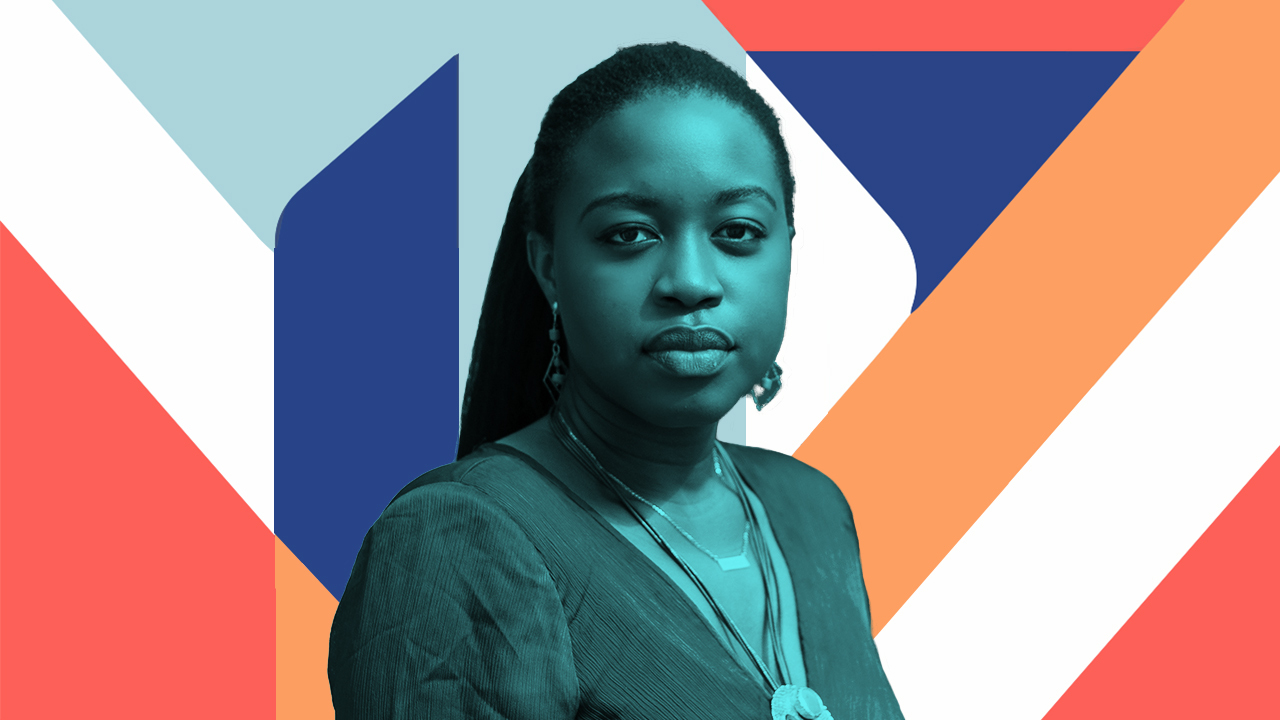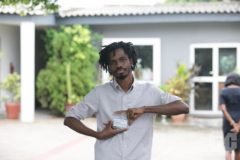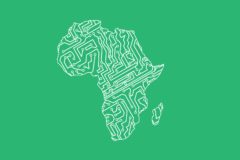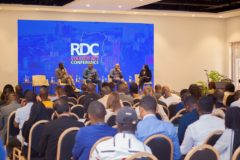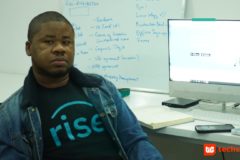My Life In Tech is putting human faces to some of the innovative startups, investments and policy formations driving the technology sector across Africa.
Feyikemi Abudu isn’t a full-time influencer on Twitter but she did as much as anyone to amplify the voice of young Nigerians during the #EndSARS movement. This is the unvarnished story of her rise, an intense month and what comes next.
Words: Alexander O. Onukwue
Images: Kay Ugwuede
FK is in her element with Jola Ayeye, her friend, business partner and fellow chief noisemaker on Nigerian Twitter.
On the “End SARS and Police Brutality” episode of I Said What I Said, their podcast, the artist Folarin ‘Falz’ Falana joins in the banter about kayan mata – “is it a spiritual something?” he asks. The co-hosts gladly explain the magic powers of the queer aphrodisiac popular in northern Nigeria. It’s October 12, a bright sunny Monday in Lagos.
Twenty-four hours earlier, the Inspector General of Police announced the disbandment of the rogue special anti-robbery squad, so there was good reason to be relaxed and upbeat after 72 hours of peaceful street protests.
But the mood in the studio changes when FK starts reading out tweets popping up at midday: Gunshots in Ojuelegba. An Uber driver has been hit by a policeman’s stray bullet.
She had feared this outcome, this escalation of hostility. Veterans of citizen-led agitations against past Nigerian governments had warned that while the three-day protests (from Thursday, October 8 to October 10) had registered a mark, security agencies would soon start responding with force.
They would label protesters anarchists, those who donated money would be accused of funding violence, and Twitter would once again be branded as a fake news platform threatening national security.
All three concerns affected FK, the 27-year old marshalling social media for the most energetic youth movement in a generation.

It wasn’t without costs. Her phone was bugged and calls monitored. For up to 10 days, she stayed in a safe house to evade government surveillance at her home. Clients and investors say she is too “politically exposed” to work with right now.
Before EndSARS, her public persona was rather straightforward; tweet thoughts to 100,000 followers without being self-conscious. Go to exotic or mundane places without fear. The past eight weeks have propelled her to 405,000 followers but there have been personal and professional consequences.
During the two-plus hours we sit for this interview at a cafe, a few people she knows come over to famz with a hug.
She obliges, but later observes that strangers who recognise her from Twitter have started doing that too and it freaks her out. She still has a packed suitcase of pantsuits, ready to disappear should an ominous call come in from Abuja.
Where does she – and her generation of Twitter-empowered young Nigerians demanding better governance – go from here? Does she regret getting into this?
I.
Feyikemi ‘FK’ Abudu says she had no expectations for fame or notoriety when she signed up for Twitter in March 2016 while living in London.
She had completed an entrepreneurship studies course at Stanford’s Graduate School of Business, and gotten a degree in Chemical Engineering from University College London. Dead set on not practicing engineering, she took a business development gig at She Leads Africa, the financial empowerment forum for African women.
Now as then, her priorities remain expanding access to financial independence – for herself and other women – and perfecting personal high maintenance.
“I want people to know that my life has been dedicated to enjoyment before now. That’s actually my primary focus in this life,” she says, in that couldn’t-care-less but cordial voice disguising deep reserves of confidence, culture and chill.
She’s always fielding questions about the magic behind her Twitter engagement. FK what’s your strategy? She leaves everyone disappointed. “I would have become a full time influencer if I had one.”
When you have 30,000 followers and lead conversations on internet-breaking days like #RedFlag day (in November 2019) as Abudu did, you’re definitely an influencer.
Brands are thirsty for relatable personalities and look to such high-engagement. Abudu has barely taken advantage of this good fortune.
“I will do a campaign from time to time depending on the brand, but I’m not always looking to monetize my large following. Most people don’t think I do anything. They really believe I make noise all the time, and I really like that. It’s fine.”
She will choose a project if it’s interesting and flows with her person – she will absolutely jump on a jumpsuit or Samsung campaign – provided it pays well. Her ground rules: won’t share flyers, won’t use brand content word for word. Since her first campaign (with Taxify – now Bolt – in 2017), she’s worked with Google, Amstel Malta, Guinness and MTN.
“That’s it,” she says knowing it comes across as a surprise.
Her actual livelihood comes from organising business development training for banks and startups. She follows in the footsteps of self-employed women in her family.
Abudu descends from King Kosoko, the traditional ruler of Lagos between 1845 and 1851. Omooba Victoria Adetola King was one of Kosoko’s great granddaughters; the surname was changed to King apparently to detach from the marginalisation that had accompanied Kosoko’s history with slavery. Omooba married three times, the third being to Christopher Akinola Thomas, a Lagos city council architect in the 1920s.
That marriage produced Modupe ‘Sisi Dupe’ Sagoe, perhaps the most popular textiles businessperson in Nigeria today. Sagoe’s daughter, Ekua Akinsanya (formerly Abudu) is Feyikemi’s mother and the proprietor of a private school in Lagos’s well-to-do Ikoyi environs. Media mogul Mo Abudu was once married to Feyikemi’s father’s brother, and high-end fashion designer Deola Sagoe was married to her mother’s cousin.
It’s not a royal bloodline but gravitas has passed down this generation of women.
“All the women in my family are coconut heads. They are accomplished women who don’t answer to anybody. You can imagine all of us sitting at a table.”

“I think that’s where [my audacity] is from. If you come for family lunch, first of all, you’ll hear us from outside. And when you get inside, everybody has a strong opinion about something.”
Abudu has been immersed in an environment where it is the women’s voice that stand out. Women who are used to building things from the ground up. This cultural background holds lots of political potential energy but Abudu winces at the suggestion.
She is passive on partisan politics, and doesn’t care much for the details of conservative vs liberal ideological battles. “I’m sure I am one of them but I can’t say to you which. By the way, we don’t even have that in Nigeria. All we have is APC, PDP, etc which are all the same.”
Being reluctant about defining her politics isn’t because she doesn’t know her values; she’s certain of her moral persuasions and pain points. But this non-partisan impression combined with a perception that she’s not desperate to cash out on clout would have significant value when she decided to wield her Twitter for the EndSARS protests.
Abudu is convinced she was on a no-fly list created by the Nigerian Ministry of Interior in the aftermath of EndSARS.
The Ministry denies that the list ever existed and that may be the case, but a strange spate of arbitrary arrests of protesters – Eromosele Adene and others – is her cue to prepare for the worst.
She looks to her phone and learns that “As we are now, five people have been arrested. One guy in Ibadan, one in Lagos. The other in Ekiti. The guy in Ibadan was taken from his house. There’s a girl in Kano that was taken from her house.”
Law enforcement agencies have sifted through protesters’ online photos and other information, going to their homes to surreptitiously pick and detain them on questionable charges.
These stings are going on while judicial panels are in session across the country. In Lagos, the Nigerian Army and the state government have shifted responsibility for the fatal shootings on the evening of October 20, 2020 at the Lekki toll gate.
Nigerians want to keep remembering October 20 as a date that will live in infamy, when a government unleashed live ammunition on its unarmed young people. Many from that night remain missing. At least one body has been found floating on water.
DJ Switch’s live Instagram stream of that night’s chaos was one of many bold citizen attempts at recording EndSARS’s bloody climax for posterity.
But in the movement’s early more peaceful days, Abudu and a group of protesters were invited into the Lagos state House of Assembly to observe discussions on policing and ending SARS.
She broadcast the proceedings live on Twitter, drawing attention to the unseriousness of deliberations in Nigeria’s state houses of parliament, especially on matters affecting youth welfare.
That was Abudu’s first day at the protests physically, when her Twitter became integral to the movement, but it wasn’t the beginning of her influence. It started with a mission to provide breakfast, would include the founding of a national legal aid network for arrested protesters, and a mistake on Twitter that could have jeopardised an important pillar of the EndSARS response operation.
II.
She was born in January 1993 in London. She also holds a Ghanaian passport.
The overwhelming majority of Nigerians in their twenties cannot relate with Abudu’s regular summer holidays to see The Mousetrap – London’s longest running play now in its 59th year, which she’s seen 8 times.
She may be constantly looking for money but Abudu is not striving for daily bread. Blend this comfort with her apathy for politics, and her nationality options, you understand why she’s often said she would not be in Nigeria when a revolution starts. I will be supporting and tweeting with you people from London.
It was a joke made before EndSARS but it wasn’t entirely without weight. Thousands strive to leave Nigeria yearly in search of a better future. Why should anyone with passports to saner climes feel any guilt taking off for a while?
Well, Abudu was concerned to see fellow Nigerians lying outside the Lagos state House of Assembly complex in the evening of the first day of 2020’s EndSARS protests. It was no longer enough to be an online spectator.
In the very early hours of October 9, Abudu tweeted for donations to help prepare food for some protesters who had stayed overnight.
Weeks before, she had helped raise money for a girl raped in the northwestern state of Jigawa, so she had recent experience with spontaneous projects like this.
Fifteen minutes after putting up the account, they had ₦500,000 ($1,030*) that became ₦2 million ($4,123) after an hour, and there was no going back.
They hit ₦5 million ($10,309) when daily protests started in Ikoyi. By this time, requests for food support were pouring in from locations outside Lagos, from virtually every region of the country. Abudu couldn’t manage this from protest grounds. Staying at home to verify requests and disburse money became her office.
By the same October 9, staff of the fintech company Flutterwave had put together ₦2 million to support the fledgling movement, but they didn’t necessarily know how to channel the money.
Abudu got their approval to use the account as a public fund and so that went from being a Flutterwave staff donation account to an EndSARS response account.
For five consecutive days between October 11 and 16 – until the Central Bank of Nigeria shut down the link and never restored it – she tweeted breakdowns of how she disbursed funds from the account. This was FK Abudu’s End SARS Response in full flight.
Meanwhile, the Feminist Coalition had started mulling a response of their own.
The group was co-founded in July 2020 by Damilola Odufuwa and Odunayo Eweniyi to advocate social, financial and political independence for women, but they had not made a public move or done any notable project.
Sensing that female protesters would be hit hardest by violent police crackdowns, the co-founders and the 11 women they invited to join Femco convened over a WhatsApp call.
After an hour, “We decided to crowdsource donations for food, water, masks, first aid kits, medical aid and legal aid,” Odufuwa says in an email to TechCabal. It was all hands on deck, a baptism of fire but a moment to seize.
Femco quickly bubbled to the top of the entire EndSARS conversation beginning on October 9. A yellow-themed charismatic logo (designed by the Buycoins co-founder Ire Aderinokun) caught attention, as did their subsequent meticulousness with public accountability – on Twitter, Instagram and their website – for donations received. “This was only possible because every founding member is at the top of her game,” Odufuwa says, noting that these women simply channeled the professional work ethic that made them notable in the first place.
Unlike Aderinokun, Helium Health’s Tito Ovia and I Said What I Said co-host Ayeye, Abudu is not a Femco founding member. She was invited in mid-October to join as an auxiliary member.
The arrangement was for her to maintain specific standalone projects and not be involved in the group’s daily administration, as would be the case for subsequent auxiliaries. Femco worked with Abudu’s existing disbursement structure, choosing to focus on fundraising specifically.
Femco’s fundraising remained independent from Abudu’s but their synergy was without rival. Synergy was important to spot fraudulent funding requests; all was checked on Google sheets for veracity. The division of labour and collaboration on funding worked to critical acclaim – and bouts of envy even among protesters.
But Abudu was too busy with life and death matters to keep score of job approval ratings.

When thirty protesters got arrested in Ogun, her home state, simply for protesting, it opened a window to wield her privilege again and kill two birds with one stone; help form a legal aid network to release protesters, while expanding EndSARS awareness to Olusegun Obasanjo’s generation.
A supporter-turned-fierce-critic of the Muhammadu Buhari administration, the 83-year old former Nigerian president lives a couple of blocks from Ernest Shonekan, another former Nigerian president. Both men live blocks from Olatunde Abudu, the respected 90-year-old lawyer and industrialist who happens to be Feyikemi’s paternal grandfather. She maps the vicinity with a small triangle.
Who to call?
“I could call Dapo Abiodun [the state governor] but obviously you don’t just call him; he’s no longer Uncle Dapo.”
“My daddy gave me the commissioner of Police’s number. I called him, he said I was disturbing his sleep. I said ‘my dear, you will wake up.’”
“I called my grandpa, I said ‘sir, for your legacy – phone Obasanjo, start waking everybody you know. People are being imprisoned in our state, it’s not normal.’”
These calls may or may not have moved the needle behind the scenes. The Nigeria Police’s culture is rooted in disobedience and disdain even for authority figures. State Police commands answer only to the Inspector General of Police in Abuja, not to state governors or other supposedly influential people. Without a federal mandate, pressure is the most anyone does to make headway at a police station.
That said, the public saw a successful legal aid structure coordinated by two lawyers Tola Onayemi and Moe Odele. They managed a national volunteer group of lawyers visiting police stations to negotiate the release of protesters, creating a one-of-a-kind pro bono legal aid network.
Abudu’s role here was not on the technicality of releasing arrested people; she is not a lawyer. Hers was making calls to influential authority figures where needed to complement the lawyers’ work.
But as more people were arrested and shot at and injured by the Police, the constant ringing of her phone will necessitate the creation of another success story of this movement; a 24-hour emergency helpline.
With Eby Ekhigbe, Funmi Oyatogun, Fola Olatunji-David, and others Abudu set up a helpline for three categories of inquiries: security, health emergency and legal aid. Unlike food requests, these could not wait for the relatively slower process of sending DMs on Twitter. Ambulances were needed in practically every state where there was a protest, thanks to rash Police shootings and the infiltration of thugs causing violence.
There was another practical reason for the helplines; dealing with scams. People got pictures of bloodshot wounds from the internet and sent them as evidence of why they needed money. Abudu was doubtful after seeing the landscape surrounding the supposed victim in one particular picture.
“I looked at the pavement and the houses in the picture and I was like” – and here she slips into character with that voice – “where in Lagos? I just looked at the street in the background and this was obviously Europe! I put it into Google image search and it was a picture already on the internet.”
“Out of 50 requests that come through DMs, maybe 20 are legitimate.”
About 20 people operated the helpline taking turns to cover 24 hours. It was a logistical success that should draw the attention of emergency response teams. But after Abudu shared a picture of the helpline volunteers on Twitter a few days after they set up, it put the makeshift startup in immediate crisis mode.
Their presence at that location, a co-working space owned by Workstation, put everyone there in danger. So they moved everyday for five days from one AirBnB to another.
They eventually settled at a hotel, operating for five days before president Buhari’s October 22 address demanded they shut it down. They missed 750 calls on the day they closed shop.
She doesn’t dwell on this error of judgment. The public moved past it like it didn’t happen. An impulsive bad tweet is almost a given for a frequent tweeter, especially by an individual expected to provide so many answers to problems she had never envisaged or had training to solve. On many levels, Abudu and her 70 or so group of volunteers were running on scraps of life experiences that were barely relevant for an emergency response; planning parties, planning tours, importing goods.
How did she not burnout?
III.
“I was drinking a lot of wine,” and bonding over the stress with fellow volunteers.
Her support included Sam Otigba who handled the provision of private security at protests (at the cost of ₦10,000 (~$20) per man hired), Folayemi Agusto who coordinated ambulances, and Oyatogun who says the group had to start “make-shift peer counselling during our review calls at night because of how much trauma the volunteers were exposed to.”
In her DMs, Abudu got constantly exposed to requests that had no bearing on EndSARS.
“I have responsibilities now that I didn’t ask for. People seem to think I have answers that I don’t have.”
One person asks for referrals for cancer treatment. A father demands recommendations for where to buy puppies. Some guy wants her to contact his local government chairman to come tar his roads.
“A lot of expectations have come as a consequence of this. But it has also opened a lot of doors in a different sense.”
“I’ve seen a lot that I would prefer to not have seen in life. I’ve seen the inefficiencies of government in a way that I would have preferred to not know that these people are truly evil.”
“We think they are incompetent but no they are not stupid. They are just evil. They hate you. That’s just the moral of everything,” she says, like a tired activist who could do with a sabbatical.
“But we did a good thing and I can never feel bad about that.”
The good thing is still ongoing. On her phone are picture after picture of hospital bills from Lagos to Asaba, the southeastern city where she’s spent about ₦12 million offsetting bills in six hospitals. She has some leftover money from Femco and an account provided by a fintech that she did not disclose following the Flutterwave skirmish. She’s determined to help clear these bills.
But she’s not willing to be changed or have her personality dominated by EndSARS. Everybody demanding a serious FK will be very disappointed.
“If I make any small joke – search my comments – you’ll see somebody saying you’re supposed to be focusing on the nation! If I slap… which nation? A nation that has been trying to arrest me, for what?”
“Definitely I feel responsible and I’m still trying to process what that’s like. But I’m not running for any office. That’s the truth.”
Instead, she’s diving deep into her business projects. She’s working on a travel bag startup that transforms plastic bottles, there’s an opportunity to work with an emergency response startup in Kenya to replicate her efforts in Nigeria. But one priority is to “grow and blow” her podcast with Ayeye.
I Said What I Said currently boasts a baseline of 10,000 listens per episode, according to Abudu. Top episodes attract up to 40,000 listens. About 82% of listeners get to the end of most episodes, an impressive feat considering they stretch from 90 minutes to over 2 hours.
Podcasts as a media form have not taken off in Nigeria and Africa broadly. It’s a data-intensive investment for consumers and production isn’t piece of cake (ISWIS’s contract with their producers, a company called Aristocrat, has run out). But as local radio stations remain under tight surveillance by government intelligence agencies, it’s only a matter of time before online radio proliferates.
Abudu and Ayeye are positioning for that future, one where they might develop varieties of serial content. They want to produce video in partnership with brands.
Right now though, the focus is on getting more listeners on as many platforms in as many locations across West Africa. They are not eager for a Spotify or Tidal type of deal that will demand exclusivity. This patience is possible because the podcast, somewhat like their Twitter, isn’t a present source of livelihood.
As Nigeria slips into another recession, it will be clear that many of Abudu’s generation will not afford a luxury of picking and choosing sources of income. Some desperation will set in and, who knows, another outpouring of civil agitation might be on the cards.
What can people who are not as secure as Abudu do?
She’s convinced that everybody has a sphere of influence. As much as she has 400k followers on Twitter, she wouldn’t be recognised at Lagos Island or at the big markets in the city. People who spread WhatsApp broadcasts were not FKs.
“Forget roles to play, everybody can vote.”
She’s ready to help raise money for “sensible” candidates during election seasons.
As for Twitter, some things have changed for her.
“There are things I want to interact with that my friends say but I know they could get flooded with mentions.” She now assumes a responsibility to not burden friends with distraction from trolls.
Her overall experience with technology has changed too.
After noticing her phone was being monitored, she started using VPNs to access the internet. Her important calls were made on Telegram or Signal.
But she won’t keep running. “I’m more paranoid but I’m like…,” she gesticulates a reluctance to keep up with a laundry list of measures to avoid government surveillance.
“I’m now like, wo, I’m not a criminal. I’m going to stop. Anything you want to see, go ahead. In fact, you’ll make me stop saying nonsense on my personal calls.”
Despite her follower boom, FK is conscious about turning 28 in January. She still has only 24 hours in a day like the rest of us. EndSARS took her to the darkest recesses of the Nigerian state, but also lifted her to the mountaintop. Now she’s more fired up than ever to secure the bag since only financially independent people can cause change.
Also, “Jumpsuits are costly and I have to buy them. We’ll figure it out.”
—
*$1 = ₦485







